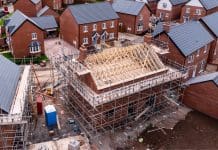As the government consults on how to raise accessibility standards for new homes, Nicholas Bungay of Habinteg discusses recent research into the challenges many disabled people have faced during lockdown because of a lack of even basic accessible features
Shortly before the start of our recent fifth annual campaign #ForAccessibleHomes, the government launched its open consultation into raising accessibility standards for new homes. The consultation asks how best to achieve an increase in the number of accessible homes and what changes to the policy and regulations regarding the optional technical standards for accessible housing would achieve the biggest impact.
Now, with some disabled people still shielding from Covid-19 and less likely to be as confident leaving their home as non-disabled people, our YouGov poll, commissioned as part of #ForAccessibleHomes week, provides concrete evidence of why it’s so important that the government acts to ensure all new homes are accessible and adaptable.
Lockdown is particularly tough disabled people
The poll reveals that during the Covid-19 lockdown, disabled people were 17 times more likely than non-disabled people to be unable to carry out all daily tasks and activities at home without help (35% v 2%) and more than two in five were unable to fully use their bathroom or kitchen without assistance (22% v 23%).
Almost a quarter (24%) of disabled people surveyed said they don’t have a home that meets their access needs.
This is the reality of life in lockdown – and potentially not too different from life pre-Covid-19 – for many disabled adults and older people living on their own and it’s not acceptable.
Furthermore, disabled adults were over three times more likely than non-disabled adults to report that the inaccessibility of their home undermined their wellbeing during lockdown (21% v 6%).
Let’s be mindful that accessible housing isn’t only about making it easier for disabled people to navigate their home and use their spaces and appliances.
As Habinteg Insight Group member Tanvi Vyas writes in her #ForAccessibleHomes week blog: “Living independently, with the right adaptations, can seriously improve possibilities, allowing opportunities for work, education, socialising and developing relationships generally.
“In my experience, the right housing improves mental and physical wellbeing whilst reducing risks of injuries and enabling life to be lived to the absolute fullest.”
It’s disheartening that there are still very few accessible homes being planned and built at a local and national level, despite the very clear need. It pushes disabled people who are employed, like Tanvi – and others who may not be eligible for a Disabled Facilities Grant – to have no other option but to plough all of their savings and earnings into adapting their home.
Local planning needs to prioritise accessibility
At present, only 9% of homes in England provide the four basic accessibility criteria to be deemed “visitable”, according to the English Housing Survey. Yet there are 14.1m disabled people in the UK.
Last year, Habinteg reviewed 322 draft and adopted Local Plans for its Insight report Forecast for Accessible Homes: Accessible Housing in Local Plans and found that less than a third of the plans analysed set out a requirement to use current accessible housing standards.
Less than half of all plans (138) set a specific requirement for a proportion of new homes to meet any form of accessible housing standards.
Outside London, only 23% of new homes due to be built by 2030 are planned to be accessible. Just 1% are set to be suitable for wheelchair users, despite there being 1.2m wheelchair users in the UK and a rapidly ageing population.
By 2030, there’ll only be one accessible new home built for every 270 people in the West Midlands, one accessible new home for every 52 people in the East of England and one accessible new home for every 24 people in London.
Accessible & adaptable design standard key
This is why we formed the Housing Made for Everyone (HoME) Coalition with the Centre for Ageing Better, Age UK, RIBA, Care & Repair England, Disability Rights UK, Housing LIN, the National Housing Federation, the Chartered Institute of Housing and the Town & Country Planning Association. All members have signed up to a shared vision and charter to ensure all new housing being built meets the changing needs of disabled people and our ageing population.
Among other things, the HoME coalition is calling for the accessible and adaptable design standard, as set out in the Building Regulations M4 Category 2, to be made the mandatory baseline for all new homes.
The Category 2 accessible and adaptable dwellings standard presents practical and sustainable elements that can be achieved at a reasonable cost: a covered entrance with outside light, wider hallways and windows that are easy to open. These are all design features that help wheelchair users to manoeuvre with ease.
And, for non-disabled people, accessible and adaptable features would help with having to move every day household items such as furniture and white goods, as well as provide easier access for parents with buggies and shopping.
Understanding the practical drivers for the requirements of the optional access standards isn’t necessarily intuitive for planners and housing professionals. This is where our in-house team of specialists – the Centre for Accessible Environments (CAE) – can help. CAE provides inclusive design consultancy services for the housing sector, including plan checking, accessibility audits, statements and strategies, design appraisals and training on the building regulation category standards.
We’re proud to say that recent clients include councils, developers and architects keen to boost their access knowledge. They include Southwark, York, Hartlepool and Islington councils, Circle 33 Housing, The Muse Development in Lambeth, Harper Downie Architects and Ian Ritchie Architects.
Sector support for consultation crucial
It’s also been encouraging to see Housing sector leads including the National Housing Federation, G15 and the Local Government Association, come forward and support the principles of accessible homes and inclusive design as part of #ForAccessibleHomes week.
The sector has until 11:45pm on 1 December 2020 to respond to the government’s open consultation into the accessibility of new homes and we should ensure we answer this call to action.
The consultation presents a key opportunity for us to stem the UK’s acute and growing shortage of accessible homes and usher in a new era, providing disabled people with a solid base from which to live the independent and fulfilling lives they want to live.
As Habinteg tenant and wheelchair user Delores Taylor makes clear: “Having a properly accessible home isn’t just a luxury, but the difference between a disabled person taking on a job or not.”
Research commissioned by Habinteg & Papworth Trust found that disabled people living in inaccessible homes are four times more likely to be unemployed.
Take action: Respond to consultation
With over 14m disabled people in the UK, predictions for our ageing society show that by 2036, 28% of the UK population will be 65 and over. We’re facing a future of retrofitting and adapting existing homes for many people as 91% of existing homes do not meet even the lowest threshold of visitability. However, the cost savings in terms of health & social care budgets would be significant.
The Building Research Establishment estimated in 2011 that the NHS could save almost £435m each year if we could remove the hazards around homes that leads to falls. Meanwhile, the cost to developers in building to Category 2 standard would be minimal (the build costs aren’t prohibitive and can be as little as £520 per property).
Habinteg is considering the consultation document and formulating our response. In doing so, we ask the housing sector and people across England to take action. Support the establishment of the accessible and adaptable standard set down in Building Regulations M4 (Category 2) as the baseline for all new homes across England and call for that when you respond to the consultation.
Visit www.habinteg.org.uk/fah for more information on our YouGov poll.
Nicholas Bungay
Director of strategy and external affairs
+44 (0)20 7822 8700
Twitter: Habinteg
LinkedIn: Habinteg Housing
YouTube: Habinteg














